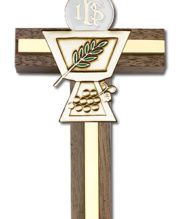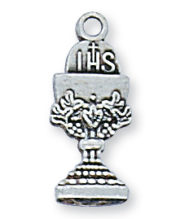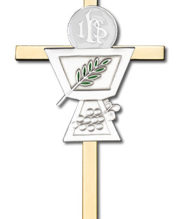Religious Education
The Ultimate First Communion Guide
First communion is a significant event in the lives of many Catholics. It is an important sacrament that marks a child’s first reception of the Eucharist, which is the body and blood of Jesus Christ. In this blog post, we will explore the meaning of first communion, the typical age for receiving it, what happens during the ceremony, and the significance of this sacrament.
What is First Communion?
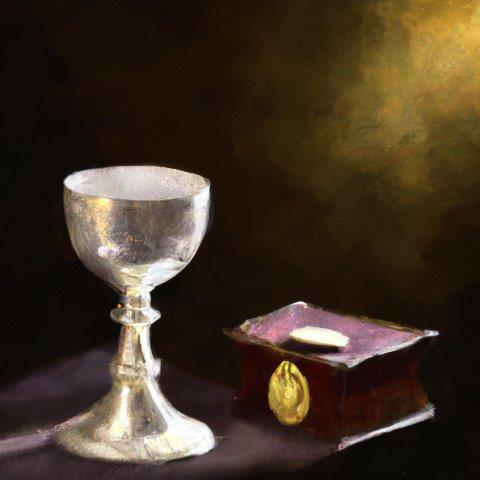 First communion, also known as the first holy communion, is a sacrament in the Catholic Church. It is the first time a child receives the Eucharist, which is the consecrated bread and wine that Catholics believe is the body and blood of Jesus Christ. It is a rite of passage that marks a child’s entry into the Church’s full communion.
First communion, also known as the first holy communion, is a sacrament in the Catholic Church. It is the first time a child receives the Eucharist, which is the consecrated bread and wine that Catholics believe is the body and blood of Jesus Christ. It is a rite of passage that marks a child’s entry into the Church’s full communion.
Holy Communion is one of the seven Catholic sacraments:
- Baptism
- Confirmation
- Holy Eucharist (also known as First Communion)
- Penance (also known as Reconciliation or Confession)
- Anointing of the Sick (also known as Last Rites or Extreme Unction)
- Matrimony (also known as Marriage)
- Holy Orders (also known as ordination)
Typical Age to Receive First Communion
The typical age for receiving first communion varies depending on the country and the diocese. In the United States, most children receive first communion between the ages of seven and eight. However, some dioceses allow children as young as six to receive first communion. In other countries, such as Spain and Italy, children typically receive first communion between the ages of nine and twelve. First Communion can also be received by adults who did not receive the sacrament at a younger age in their life.
What Happens During First Communion?
The first communion ceremony is a significant event in the life of a young Catholic. The ceremony typically takes place during a Mass and involves several rituals. The child is usually dressed in a white outfit, which symbolizes purity and the new life in Christ that they are entering.
The ceremony begins with the child and their family being called forward to receive the Eucharist. The child receives a small piece of the consecrated bread and a sip of wine from the priest or deacon. After receiving the Eucharist, the child returns to their seat and spends time in silent prayer and reflection.
What is the Significance of First Communion?
First communion is a significant sacrament in the Catholic Church as it marks a child’s entry into full communion with the Church. It is a rite of passage that marks the child’s spiritual growth and deepening relationship with God. Through the Eucharist, Catholics believe that they are nourished by the body and blood of Jesus Christ, and this strengthens their faith and relationship with God.
Why Do People Wear White for Their First Communion?
Wearing white is a tradition that dates back to the early days of the Church. In the early Church, people who were baptized wore white clothing as a symbol of their new life in Christ. This tradition has been passed down to modern times, and today, children wear white clothing for their first communion as a symbol of their purity and new life in Christ.
What is the history and origin of Holy Communion?
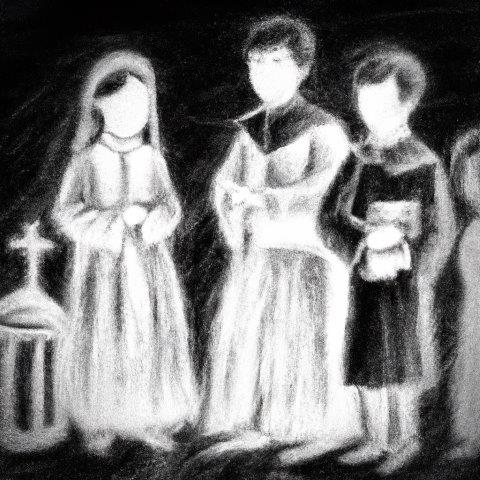 The history of Holy Communion in the Catholic Church dates back to the Last Supper, where Jesus shared bread and wine with his disciples and instructed them to do the same in remembrance of him. The early Christian Church continued this practice, but it wasn’t until the Middle Ages that the Church began to formalize the celebration of First Communion.
The history of Holy Communion in the Catholic Church dates back to the Last Supper, where Jesus shared bread and wine with his disciples and instructed them to do the same in remembrance of him. The early Christian Church continued this practice, but it wasn’t until the Middle Ages that the Church began to formalize the celebration of First Communion.
During the Middle Ages, the Church began to restrict access to the Eucharist, limiting it to ordained clergy and the wealthy elite. This was due in part to concerns about the unworthiness of the common people to receive the body and blood of Christ. However, by the 13th century, the Church began to loosen these restrictions, and children began to receive their First Communion around the age of 7.
In the 16th century, the Council of Trent further solidified the practice of First Communion as a sacrament of initiation into the Catholic Church. The council declared that all Catholics must receive the Eucharist at least once a year, and emphasized the importance of First Communion as a means of deepening one’s faith and connection to Christ.
Over time, the celebration of First Communion became more formalized, with specific liturgical rites and ceremonies developed to mark the occasion. Today, children often wear white garments or dresses, symbolic of their purity and innocence, and receive a special blessing from the priest during Mass.
In summary, the history of First Communion in the Catholic Church dates back to the Last Supper and has evolved over time to become a formal sacrament of initiation into the Church. While it was once restricted to ordained clergy and the wealthy elite, the practice of First Communion has since been opened up to all Catholics and remains an important rite of passage for children and adults alike.
How to plan a party to celebrate First Communion
First communion is a special sacrament for Catholics, and it is a time of celebration for the child and their family. Planning a party to celebrate this momentous occasion can be a great way to honor the child’s achievement and create lasting memories. In this blog post, we will explore some tips on how to plan a party to celebrate first communion.
Choose a Venue
The first step in planning a party is to choose a venue. You can host the party at your home, a park, or a rented event space. If you choose to host the party at your home, make sure you have enough space to accommodate all your guests. You can also consider renting a venue that offers catering services and other amenities to make the planning process easier.
Set a Budget
Setting a budget is an important part of party planning. Determine how much you are willing to spend on the party and allocate your budget accordingly. Consider the cost of venue rental, catering, decorations, and other expenses. Be realistic with your budget and try to stick to it to avoid overspending.
Send Invitations
Once you have chosen the venue and set a budget, it’s time to send out invitations. You can create personalized invitations or purchase pre-made ones. Ideally, the invitation card is related to the theme; for example a Chalice and Host First Communion Greeting Card. With the inside blank, this allows you plenty of flexibility to customize your invitation message. Since Holy Communion dates back to Jesus’ Last Supper, consider a Holy Communion Last Supper Invitation Card. Make sure to include all the relevant details, such as the date, time, and location of the party. You can also include information about the dress code or any special requests, such as bringing a dish to share.
Plan the Menu
The food and beverages are an essential part of any party. When planning the menu, consider the age range of your guests and any dietary restrictions they may have. You can choose to hire a caterer or make the food yourself. Some popular food options for first communion parties include finger foods, sandwiches, pasta dishes, and desserts such as cake or cupcakes.
Decorate the Venue
The decorations can set the mood for the party and make it more festive. Consider a religious theme for the decorations, such as crosses or angels. You can also use the child’s favorite colors or incorporate elements of their personality into the decorations. Balloons, streamers, and tablecloths can add to the ambiance of the party.
Plan Activities
Having activities planned for the party can keep the guests entertained and engaged. You can plan games, crafts, or other activities that relate to the religious significance of the event. If the party is for children, you can consider hiring a face painter or renting a bounce house to keep them entertained.
Create a Keepsake
A first communion party is a memorable occasion, and creating a keepsake can help the child remember the event for years to come. You can create a photo album or scrapbook, or even give out small gifts such as personalized prayer cards or religious-themed bookmarks. A Holy Communion Keepsake Box is an excellent gift for the recipient to store memorable items, such as a Patron Saint Rosary or First Communion Pendant.
A first communion party is a special way to celebrate a child’s achievement and create lasting memories. By following these tips, you can plan a successful party that honors the significance of the sacrament and creates a festive atmosphere for your guests. Remember to enjoy the planning process and celebrate the occasion with your loved ones!
Popular Holy Communion Gifts
First Communion is a significant milestone in a Catholic child’s life, and it’s a special occasion for both the child and their family. It’s common for family and friends to give gifts to the first communicant to celebrate this momentous occasion. In this blog post, we’ll explore some typical gifts for First Communion and offer advice on what parents and grandparents should give.
Typical Gifts for First Communion
A rosary is a popular gift for First Communion. It’s a special and personal gift that the child can use throughout their life to pray and connect with their faith. A simple or personalized rosary can make a meaningful and lasting gift. Often, a loved one will give a Patron Saint Rosary as a gift to a Holy Communion recipient who has a particular affinity for a saint, or shares a name with a saint.
- Bible or Bible Stand
Another common gift for First Communion is a Bible. A personalized Bible with the child’s name and the date of their First Communion can be a cherished keepsake. A children’s Bible with illustrations can also make a great gift. If the recipient already owns a bible, you can gift them with a personalized bible stand to hold their bible proudly in the center of their home.
- Prayer Book
A prayer book can be a meaningful and practical gift for First Communion. It can help the child deepen their faith and provide guidance for prayer and reflection. A personalized prayer book can also make a thoughtful keepsake.
- Holy Communion Cross or Crucifix
A cross or crucifix can serve as a visual reminder of the child’s faith and their commitment to Christ. It can be a decorative and meaningful gift that the child can display in their room or wear as a necklace.
Religious jewelry such as a pendant, charm, or bracelet can make a meaningful and personal gift for First Communion. It can serve as a daily reminder of the child’s faith and the importance of their First Communion.
First Communion Gifts from Parents
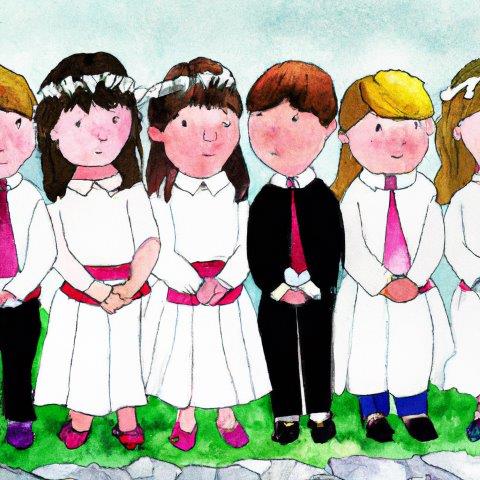 Parents can give their child a variety of gifts to celebrate their First Communion. Here are a few ideas:
Parents can give their child a variety of gifts to celebrate their First Communion. Here are a few ideas:
-
A special outfit for the occasion, such as a white dress or suit, or religious apparel to wear after their First Communion
-
A commemorative photo album or scrapbook
-
A personalized prayer card or certificate
-
A religious-themed book, or Holy Communion Bookends which can be used to hold a collection of religious books.
- A Holy Communion Water Font is a way to combine gifts to celebrate both the recipient’s baptism and Holy Communion. This is a particularly useful gift for individuals pursuing their Rite of Christian Initiation of Adults (RCIA).
- A First Communion Magnet, to display in the center of the home, as a daily reminder of the sacrament they just received.
Holy Eucharist Gifts from Grandparents
Grandparents can also give special and meaningful gifts to the First Communicant. Here are some ideas:
-
A special piece of religious jewelry, like a chalice pendant, so the recipient can constantly wear a reminder of their First Communion.
-
A personalized Bible or rosary
-
A religious-themed piece of art or décor for their room, or a decorative Last Supper Magnet for the kitchen refrigerator as a daily reminder of their sacrament of First Communion.
-
A donation to a religious charity or organization in honor of the child’s First Communion
- A congratulatory greeting card, to personalize a note of love and joy you have for the recipient. Holy Communion congratulation cards include:
First Communion, also called Holy Eucharist, is a significant milestone in a Catholic child’s life, and it’s a time of celebration for both the child and their family. Giving a meaningful and personal gift can make the occasion even more special. Whether you choose a rosary, Bible, prayer book, or another religious-themed gift, the most important thing is to honor the child’s commitment to Christ and celebrate their faith journey.
Popular First Communion Gifts
Crosses & Crucifixes
Holy Communion
Crosses & Crucifixes
Tips for Preparing for Holy Communion
Preparing for Holy Communion is an important step in a Catholic’s spiritual journey. It is a time when individuals are invited to participate fully in the sacrament of the Eucharist and to receive the body and blood of Christ. In this blog post, we will discuss how both children and adults can prepare for First Communion and how parents can support their children during this process.
Preparing for First Communion as Children
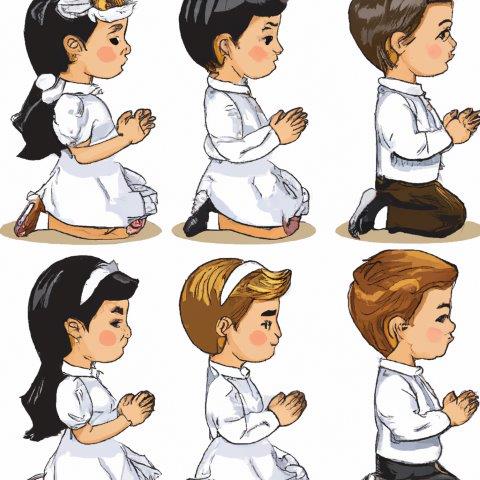 For children, preparation for First Communion typically involves attending religious education classes, known as First Communion preparation classes. These classes are usually held at the church or in the parish and are designed to teach children the basic teachings of the Catholic Church, including the meaning and significance of the Eucharist.
For children, preparation for First Communion typically involves attending religious education classes, known as First Communion preparation classes. These classes are usually held at the church or in the parish and are designed to teach children the basic teachings of the Catholic Church, including the meaning and significance of the Eucharist.
Children may learn about the history of the Eucharist, the importance of attending mass, and the symbols and rituals of the sacrament. They may also learn about the prayers and responses they will use during the Mass and practice receiving the host and wine.
Parents can support their children during this process by attending classes with their child, encouraging them to participate actively in class, and practicing the prayers and responses with them at home. It is also important for parents to lead by example by attending Mass regularly and discussing the importance of the Eucharist in their daily lives.
Preparing for First Communion as Adults
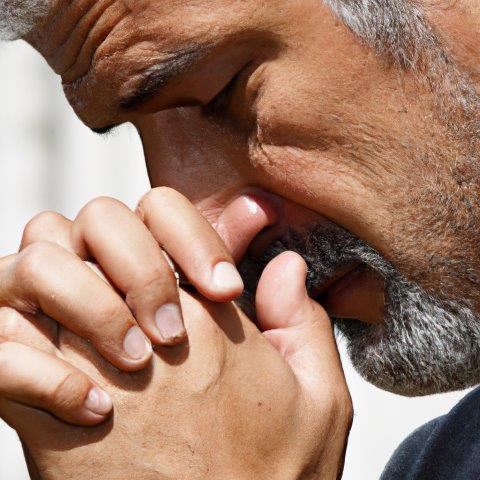 For adults who are preparing for First Communion, the process may differ from that of children. Adults may participate in RCIA (Rite of Christian Initiation for Adults) classes, which are designed to provide a comprehensive overview of the Catholic faith. RCIA classes are typically led by a team of instructors and involve discussions, readings, and prayer.
For adults who are preparing for First Communion, the process may differ from that of children. Adults may participate in RCIA (Rite of Christian Initiation for Adults) classes, which are designed to provide a comprehensive overview of the Catholic faith. RCIA classes are typically led by a team of instructors and involve discussions, readings, and prayer.
Adults may also be required to participate in individual meetings with a priest or spiritual advisor to discuss their spiritual journey and any questions or concerns they may have about the Catholic faith.
Parents Supporting their Children
Parents play a crucial role in preparing their children for First Communion. Here are a few ways parents can support their children during this process:
-
Attend Mass Regularly: Attending Mass regularly as a family is an excellent way to teach children the importance of the Eucharist and to prepare them for First Communion.
-
Encourage Active Participation: Encourage your child to participate actively in First Communion preparation classes and practice the prayers and responses with them at home.
-
Discuss the Importance of the Eucharist: Talk to your child about the importance of the Eucharist in your daily lives and how it can help them to grow closer to Christ.
-
Read and Pray Together: Read religious texts and pray together as a family. This can help your child to develop a deeper understanding of their faith and to feel more connected to the Catholic community.
Prayers for Individuals Receiving the Sacrament of Holy Communion
First Communion Prayer for Grace
Dear Lord, as I prepare to receive you in Holy Communion, I ask for your grace and mercy to fill my heart. Help me to approach this sacred moment with reverence and humility. May your body and blood nourish my soul and strengthen me to live a life pleasing to you. I pray that this communion will deepen my love for you and help me to grow in holiness. Amen.
First Communion Prayer for Humility
Lord Jesus, I believe that you are truly present in the Eucharist. As I receive you in Holy Communion, I offer myself to you as a living sacrifice. May your grace transform me and renew my mind, body, and soul. Help me to live my life in a way that reflects your love and mercy to those around me. I pray that this communion will unite me more closely to you and to your Church. Amen.
First Communion Prayer for Trust
Dear Jesus, as I approach the altar to receive you in Holy Communion, I offer you all of my joys and sorrows, my hopes and fears, and my struggles and triumphs. I trust that you know me better than I know myself and that you will give me the strength and guidance I need to follow you faithfully. Help me to receive you with a pure heart and a deep sense of gratitude for your infinite love and mercy. Amen.
Spiritual Reflection for First Communion Participants
Receiving Holy Communion is one of the most profound experiences we can have as Catholics. It is a moment when we are united with Christ in a very real and tangible way. It is a moment when we are reminded of his sacrifice on the cross and his boundless love for us. As we receive the Eucharist, we are invited to open our hearts to the transformative power of his grace. We are called to allow his love to change us, to heal us, and to inspire us to be better versions of ourselves. May we always approach Holy Communion with reverence, humility, and a deep sense of gratitude for this amazing gift.
Conclusion
Preparing for First Communion is an important step in a Catholic’s spiritual journey. Whether you are preparing as a child or an adult, it is important to approach the process with an open heart and a willingness to learn. By attending classes, participating actively, and praying together as a family, individuals can prepare themselves for this meaningful sacrament and deepen their connection to Christ. Parents play an essential role in supporting their children during this process, and by leading by example and discussing the importance of the Eucharist, they can help their children to develop a lifelong connection to their faith.

